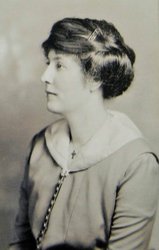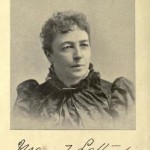 Last week I tweeted some random poetry links and one of them stayed with me long past the conversation. In historical romance circles an argument is sometimes made that people are different now. Time transmogrifies us into new beings. It’s this belief that allows us emotional distance from the sins of the past. I fundamentally disagree. I see humanity as a constant ocean of social movement, the currents rising and falling with different prevailing thoughts.
Last week I tweeted some random poetry links and one of them stayed with me long past the conversation. In historical romance circles an argument is sometimes made that people are different now. Time transmogrifies us into new beings. It’s this belief that allows us emotional distance from the sins of the past. I fundamentally disagree. I see humanity as a constant ocean of social movement, the currents rising and falling with different prevailing thoughts.
When a war ends, the soldiers go home. So it is with everything. Victorian / Edwardian poetry can be a revelation. Which brings us to Karle Wilson Baker. At The Picture Show is a poem she published in 1915. The poem itself does not read like the thoughts of a moment in time a hundred years past. It is immediate.
Working class parents take their children to the movies. They sit and watch the show, tired from the labor of their daily lives. United, together, a group out for a moment of enjoyment. Her thoughts wander back to her younger years when she followed a beautiful man into a different way of life.
And while her hand plays with the baby’s curls
Unthinking, once again she sees the face
That swayed her youth as ocean tides are swayed
Until she broke her heart to save her soul . . .
– Karle Wilson Baker, “At The Picture Show”
Baker goes on to assure the audience that her heroine is happy in her daily life. She’s rebuilt. She had the strength to leave and the strength to survive, indeed to thrive. In her mind, watching a movie star, she remembers what was good about that time, that man, and she dreams a little.
She does not pick this player-man, or that,
But all the heroes have some trick of his. . . .
– Karle Wilson Baker “At The Picture Show”
So here is our good Edwardian mother. She’s not shunned or unloved or desperate. She is just a person, like any of us are a person. Sitting in a movie theater letting her mind drift. Older, wiser, and still a sexual being.
Karle Wilson Baker led an interesting life, including a Pulitzer nomination. She was also the author of the more difficult to interpret Unser Gott. Written in the same era and concerning itself with WW1, it’s more challenging. Railing against the war she rages about the role of religion and faith in global combat. She dreams of a God large enough to embrace the world, to end the secular and regional violence. Even as she does, she realizes humanity is too flawed.
But, do the best I may, my God is white
– Karle Wilson Baker “Unser Gott”
The final section always leaves me conflicted. The me of now, wanting to believe that those who inspire us are as we are, wants to read it as angry condemnation. The other me knows that is the easy path. The narrator is likely sincere, her deep racism such that the scene she describes is a true reflection of her heart. Most days I’m certain it is. That certainty brings me back to Unser Gott again and again. We use different words, we wear different clothes, but the same hearts beat on. Try as we might, for many God stays white.


